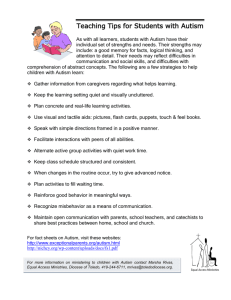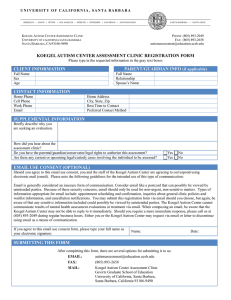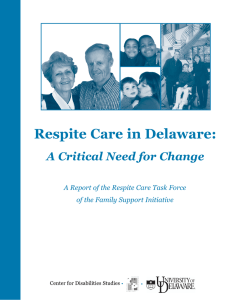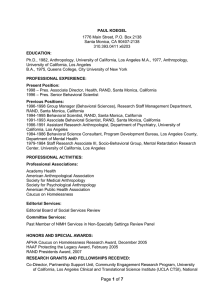supporting parents raising children with autism: a participatory
advertisement
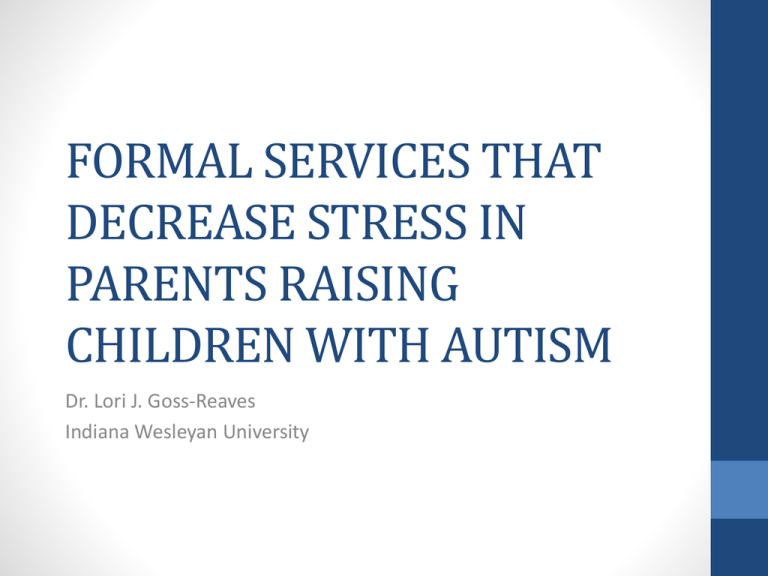
FORMAL SERVICES THAT DECREASE STRESS IN PARENTS RAISING CHILDREN WITH AUTISM Dr. Lori J. Goss-Reaves Indiana Wesleyan University Why research services and autism? • Number continues to rise • Parents report a greater number of stressors • Rely on a variety of formal and informal supports • Do not always reduce parental stress • Indiana Medicaid Waiver programs Literature: Overview • Greater number of stressors • Reported to impact the entire family system • Social support • Less depressive symptoms and somatic problems • From teachers • A belief in the effectiveness of educational/therapeutic intervention Literature: Formal Social Support • • • • • • Behavioral intervention programs Parent education programs and support groups Public school services Respite care Early intervention services Psychotherapy Literature: Areas of Research Longitudinal studies needed to provide base line data Description of services available in context of psycho-social needs Autism programs and services Psychoeducational documentation & evaluation of programs and services Exploration of caretaker/ therapist burnout McGrath (2006) Design: Overview • Participatory Action Research Approach • Qualitative methods for data collection • Data were collected through • Semi-structured interview • primary stakeholder • secondary stakeholder • Three focus groups with primary and secondary stakeholders combined Participants: Overview • Eleven primary stakeholders (25-52) • 10 male children and 1 female • 3- 0S, 3- 2S, 4- 1S, 1-4S • 2 fathers and 9 mothers • 4 M, 4 S, 2 D, 1 UM • All H.S. diplomas • • • • 3 bachelors degrees 2 associate’s degree one a certificate one a master’s degree • Three secondary stakeholders • All professionals who worked in the field of autism Community: Formal Services • First Steps • Speech Therapy • Occupational Therapy • Physical Therapy • Public School IEP services • preschool • ABA • Family Counseling • Career counseling • Medicaid Waiver Services • Respite care • Special Ed. Co-Op Activities Results: Overview • Parents in the ABC Community are relying on formal supports to help their child with autism • These services do not always reduce parental stress • 91% of primary stakeholders reported that their child was receiving formal services Results: Decreased Parental Stress • • • • • Impact on the family system In the home or community Provided support to parents and relief from daily care Impact on the child’s development Provider advocated for the child and understood the needs of the parent Results: Service Needs Prioritized • Emotional Support for the Parents • A hub or centralized location to learn about resources and activities • A break from the daily care • More options in therapy • Support Group Conclusion: Action Plan • Help at time of diagnosis • First aid kit • A hub • Service providers better understanding parent’s needs • Community presentations • Respite Care • Addition to support group Discussion: Overview • Practice was improved • Secondary stakeholders • Community presentations • Change occurred in community • Community calendar • Stakeholders empowered • First Aid Kit Questions lori.reaves@indwes.edu References Alitere & Kluge, 2009; Bishop, Richler, Cain, & Lord, 2007; Cassano, Adrian, Veirs, & Zeman, 2006; Center for Disease Control, 2012; Cullen & Barlow, 2002; Edwards, 2008 ; Ekas, Whitman, & Shivers, 2008; Hastings & Johnson, 2001; Higgins, Bailey, & Pearce, 2005; Knafl & Santacroce, 2004; Koegel, Koegel, & Carter, 1999; Ladd, 2005; Law, Plunkett, Taylor, & Gunning ,2008; LeCouer, 2007; Patton, 2002; Piven, Chase, Landa & Wzorek, 1991; Rodrigue, Morgan, & Geffken, 1992; Sivberg, 2002; Stringer, 1999; Stringer & Dwyer, 2009 ; Tarakeshwar & Pargament, 2001; Zeman, Swanke, & Doktor, 2011






